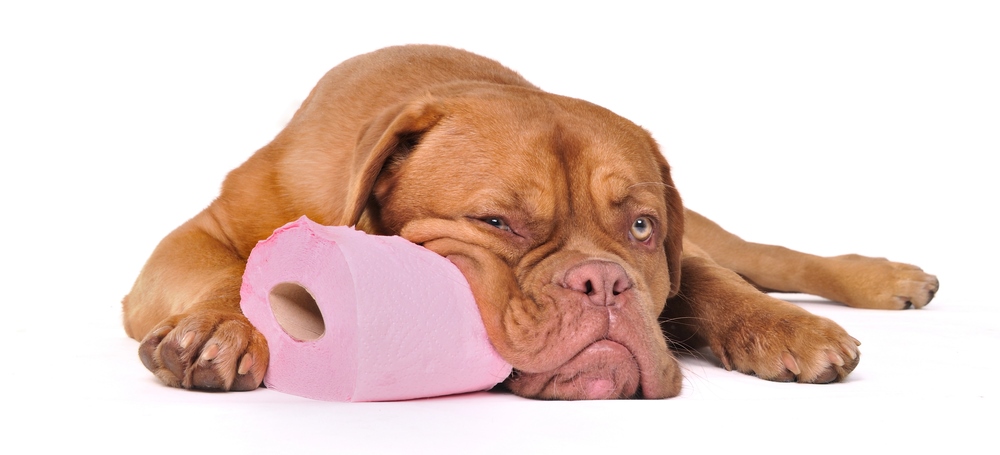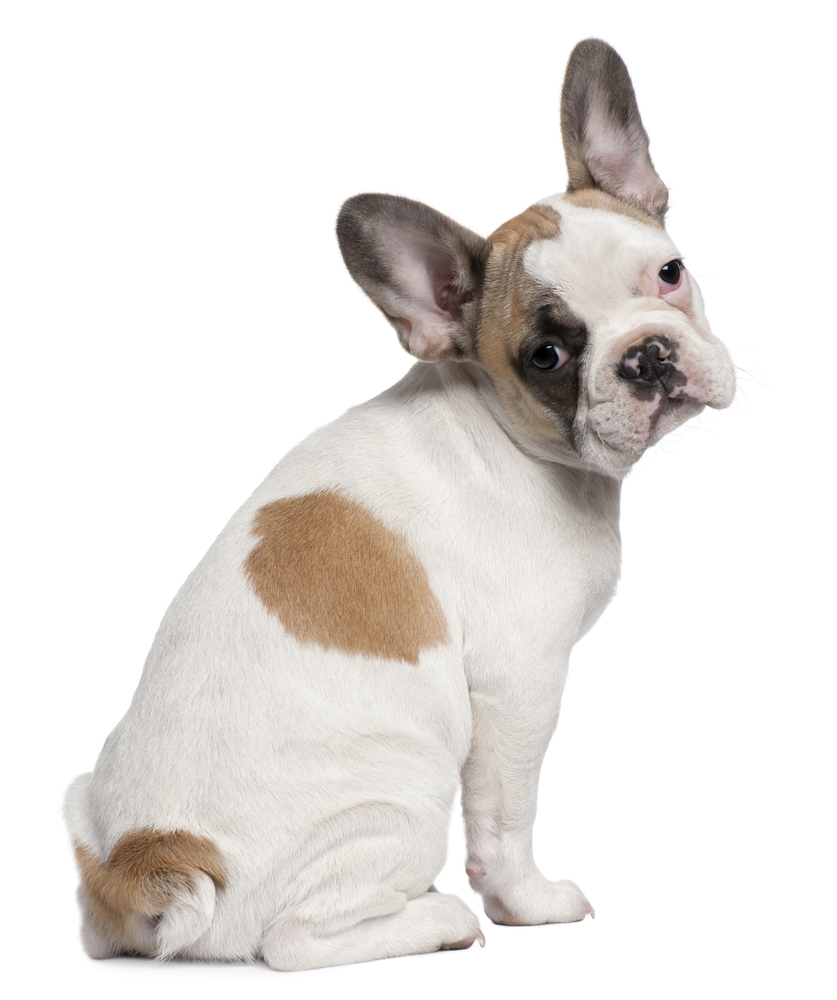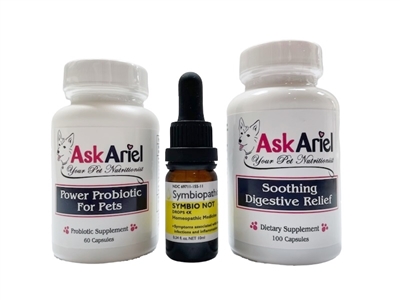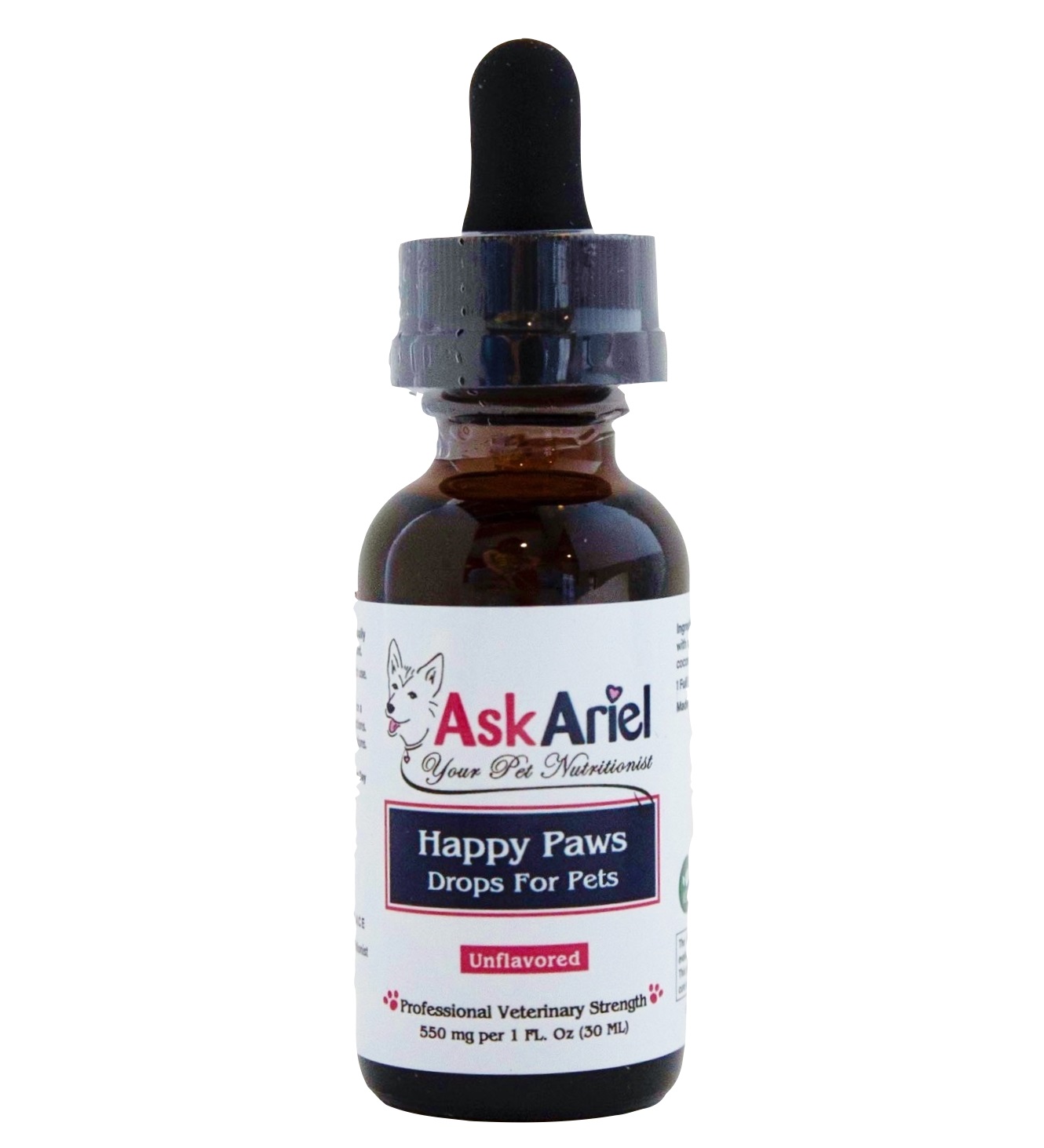|
Colitis In Dogs Treatment
Colitis in dogs is a common condition characterized by inflammation of the colon (e.g. the large intestine) leading to symptoms such as diarrhea, straining during bowel movements, and occasional blood or mucus in the stool. While colitis can be a one-time occurrence, some pets may experience recurrent episodes, indicating chronic inflammation. Identifying the cause of colitis often requires a thorough veterinary examination along with diagnostic testing. Treatment for colitis in dogs involves addressing the underlying cause, managing symptoms, and making appropriate dietary modifications.
What Are The Symptoms Of Colitis In Dogs?

Diarrhea: One of the hallmark symptoms of canine colitis is diarrhea. The stool may be loose, watery with blood or mucous as colitis can cause a great deal of inflammation in the bowel. The blood may appear as streaks, clots or cause the stool to have a dark, tarry appearance.
Straining to Defecate: Dogs with colitis may show signs of discomfort or pain while trying to pass stool.
Constant Urge To Go: Dogs with colitis may have a constant urge to go and may not be able to hold it even just to get to the outside door. They may need to go more often than usual. Sometimes they may just have liquid diarrhea.
Abdominal Discomfort: Signs of abdominal pain or discomfort, such as restlessness, pacing, or sensitivity when the abdomen is touched.
Dog Farting: The inflammation associated with colitis can affect the balance of beneficial and harmful bacteria in the dog's gut. Changes in the microbial balance may contribute to the production of gases that result in smelly dog farts.
Malabsorption: In cases of canine colitis, the inflamed colon may have difficulty absorbing nutrients properly. Malabsorption can lead to undigested food particles reaching the large intestine, where they can ferment and produce canine flatulence. This malabsorption can also cause weight loss.
What Does Colitis Dog Poop Look Like?
The consistency and appearance of a dog's stool when they have colitis can vary depending on the underlying cause and the severity of inflammation. Overall there is a greater amount of poop. Sometimes the dog's stool may appear nearly formed while other times it can be liquid diarrhea. Common characteristics of colitis in a dog's stool frequently includes:

Diarrhea: Dogs with colitis often experience liquid, gooey, or mushy diarrhea, resulting in loose, watery stools. The diarrhea may be intermittent or chronic, depending on the nature of the colitis.
Blood: The presence of blood in the stool is a common feature of colitis. The blood may appear as red streaks, clots, or cause the stool to have a reddish or dark, tarry appearance in the midst of the liquid or gooey consistency.
Mucus: Inflammation of the colon can lead to the production of mucus, contributing to the slimy or gel-like consistency of the stool, which may add to the overall mushy texture. Mucus in a dog's stool with colitis may appear light in color and stringy.
Odor: Canine colitis can affect the odor of the dog's stool and it may become more pungent or unpleasant. This change in odor can be attributed to the inflammation in the colon, the presence of mucus, and alterations in the normal digestive process.
Color: The color of the stool in dogs with colitis can vary. It may range from normal brown to yellowish, greenish, or even reddish-brown due to the presence of blood. The color change is often linked to the underlying cause of colitis, such as inflammation or bleeding in the gastrointestinal tract. Changes in color, especially the presence of bright red or dark tarry stools, may indicate bleeding and require prompt veterinary attention.
Diagnosing Colitis In Dogs
It's important to note that colitis can be a result of a single cause or a combination of factors, including certain health conditions like pancreatitis. Identifying the specific cause often requires a thorough examination by a veterinarian, including diagnostic tests such as bloodwork, fecal analysis, and imaging. Treatment will depend on addressing the underlying cause, managing symptoms, and providing appropriate dietary modifications.
Acute Vs Chronic Colitis: Colitis in dogs can be acute or chronic. The distinction lies in the duration and nature of the inflammation. Acute colitis in dogs can be a one-time occurrence and often occurs abruptly, triggered by various factors such as dietary indiscretions, sudden changes in diet, infections, or stress. However, recurrent acute episodes can lead to chronic colitis, especially if underlying factors like persistent stress, dietary issues, or undiagnosed conditions are not addressed. Chronic colitis in dogs may involve periods of exacerbation and remission, with symptoms flaring up during stressful times or due to changes in the pet's environment.
Ulcerative Colitis: Ulcerative colitis in dogs is a specific form of inflammatory bowel disease (IBD) that involves inflammation and ulcers in the colon and rectum of the dog. Treatment may entail medications to reduce inflammation, such as steroids or immunosuppressants, as it is thought to be an abnormal immune response (autoimmune disease) in the gastrointestinal tract.
Causes Of Colitis In Dogs
Colitis in dogs can be caused by a variety of factors such as:

Dietary Factors: Sudden changes in diet, food allergies (allergic colitis), or the consumption of inappropriate or spoiled food.
Infections: Bacterial, viral, or parasitic infections can affect your dog's microbiome and cause intestinal dysbiosis.
Food Allergies: Allergic colitis in dogs can arise when pup consumes an allergen, prompting an immune response and inflammation. Common culprits such as beef, poultry, grains like wheat, or dairy may be the triggers. High fat foods can also be a catalyst for colitis.
Parasites: Intestinal parasites such as worms and giardia can cause colitis disease in dogs.
Toxic Ingestion: Ingesting toxic substances, plants, or certain medications can lead to gastrointestinal irritation and colitis.
Stress: Stressful events such as changes in environment, routine, or the addition of new pets or family members can contribute to stress colitis in dogs.
How To Treat Colitis In Dogs Naturally
1. Consult With Your Veterinarian: Your vet can identify the underlying cause of your dog's colitis and recommend the most suitable approach for your dog's needs.
2. Feed A Specialized Diet: Switching to a highly digestible, reduced-fat hypoallergenic diet can reduce symptoms of colitis in dogs. A gradual transition to a new diet is helpful. Many pet owners have found a novel protein (e.g. rabbit or venison) raw frozen food to be an effective dog colitis diet. Dogs with colitis often have sensitive digestive systems. High fat foods can exacerbate gastrointestinal issues. It's best not to feed dogs with colitis fatty meats such as bacon, dairy products, fried foods, or table scraps.
3. Add Fiber: A high fiber diet for dogs with colitis can help regulate bowel movements and firm up stool. Pumpkin, pumpkin powder, sweet potatoes, or a fiber supplement for dogs can be beneficial.
4. Use Probiotics: Probiotics for dogs with colitis introduce beneficial bacteria to the gut, promoting a healthy balance and improving digestion. These beneficial bacteria aid in the restoration of gut flora helping to alleviate and digestive discomfort. Choosing a probiotic for dogs with colitis that includes prebiotics is essential as prebiotics provide the necessary nutrition to support the growth of friendly bacteria. Prebiotics foster a more resilient and balanced gastrointestinal environment for dogs with colitis.
5. Stress Management: Stress can exacerbate colitis in dogs. Effective ways to manage your dog's stress include creating a stable and predictable environment, along with maintaining a consistent and balanced diet tailored to your pet's specific needs. In addition to these measures, ensuring your pet receives regular exercise, love, and attention can significantly contribute to their overall well-being.
6. Home Remedies: Natural remedies for colitis in dogs can help ease symptoms. Dogs with colitis may experience difficulty in absorbing essential nutrients from their food due to inflammation in the digestive tract. Digestive enzymes help breakdown nutrients, improving absorption and facilitating better digestion. Hemp extract is considered one of the best home remedies for stress colitis in dogs. It has anti-inflammatory properties which could lead to decrease in symptoms such as diarrhea, abdominal pain and discomfort.
Natural Supplements For Colitis In Dogs

Inflammatory Bowel Disease Kit For Dogs
Supports dog gut health
Fast digestive relief for dogs
Firms up stool and controls diarrhea
Contains 3 supplements for maximum effectiveness
This natural dog colitis treatment delivers amazing results! Our IBD Kit has been used successfully to help many pets with inflammatory bowel disease (IBD), irritable bowel syndrome (IBS), colitis, chronic diarrhea and digestive upset.
Learn more about the IBD Kit

Happy Paws Organic Hemp Extract
Professional veterinary strength hemp extract
Helps pets with anxiety, pain and digestive discomfort
Easy to administer
Concentrated 550 mg formula
IBD (Inflammatory Bowel Disease), IBS (Irritable Bowel Syndrome) and colitis are characterized by an abnormal accumulation of inflammatory cells in the intestine. This can result in gas, mucus, and bloody stool. Pets with IBD, IBS and colitis frequently experience diarrhea, vomiting, and gurgling tummies. These conditions are commonly caused by food intolerances. However, stress can work both ways when it comes to digestive problems. Stress can increase digestive problems but pain and discomfort from digestive problems can also make the pet feel stressed and anxious. The anti-inflammatory properties of Happy Paws Hemp Oil can help treat IBD by restoring normal gut motility and reducing the inflammation in the digestive tract.
Learn more about Happy Paws Drops
|